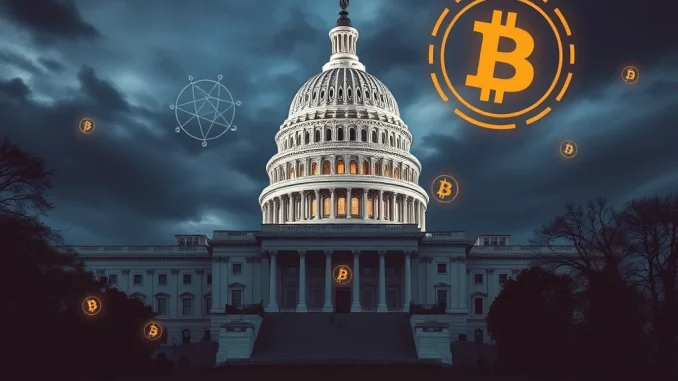
The crypto world is holding its breath. A crucial moment is approaching that could significantly shape the future of digital assets in the United States. The US Senate is poised to take a landmark vote on a stablecoin bill, potentially as early as late May, just before the Memorial Day holiday.
What is This US Senate Stablecoin Bill?
This isn’t just another piece of proposed legislation. This specific stablecoin bill has already cleared a significant hurdle, having been passed by the powerful Senate Banking Committee back in March. Its core purpose is to establish a clear regulatory framework for stablecoins, which are cryptocurrencies designed to maintain a stable value, often pegged to the US dollar.
According to reports, the bill focuses on two primary areas:
- Licensing Requirements: Issuers of dollar-pegged stablecoins would likely need to obtain specific licenses, potentially from federal or state regulators, or a combination thereof. This aims to bring these entities under formal oversight.
- Reserve Rules: The legislation proposes strict rules regarding the reserves that back stablecoins. This is a direct response to past incidents where stablecoins lost their peg due to insufficient or risky reserves. The goal is to ensure that stablecoins are fully backed by safe, liquid assets, providing greater confidence and stability.
Think of it like regulating a money market fund or a bank deposit, but for the digital age. The idea is to ensure that when you hold a dollar-pegged stablecoin, you can trust that it is indeed worth one dollar and can be redeemed reliably.
Why is Stablecoin Regulation Crucial Now?
Stablecoins have grown exponentially in popularity and usage, becoming a critical part of the broader crypto ecosystem. They act as a bridge between traditional finance and decentralized applications, facilitating trading, lending, and payments.
However, their rapid growth without clear rules has raised concerns among policymakers about potential risks:
- Financial Stability: If a major stablecoin were to fail or lose its peg unexpectedly, it could trigger instability across the crypto market and potentially impact traditional financial systems given the increasing interconnectedness.
- Consumer Protection: Without clear rules, consumers holding stablecoins might not have adequate protection if an issuer mismanages reserves or faces insolvency.
- Illicit Finance: Like any digital asset, stablecoins can potentially be used for illicit activities, making regulatory clarity important for law enforcement and national security.
Establishing clear stablecoin regulation is seen by many as a necessary step to integrate this technology safely into the economy and unlock its full potential for payments and innovation while mitigating systemic risks.
Navigating the Bipartisan Path: Will the Senate Vote Succeed?
Getting any significant legislation through the US Senate is a complex process, often requiring broad agreement. The fact that this stablecoin bill emerged from a committee with bipartisan support is a positive sign, as reported by U.Today and others. This suggests that there is a shared understanding across the political spectrum regarding the need to address stablecoins.
However, achieving a successful Senate vote on the floor can still face challenges. While bipartisan support is expected, there is also reported opposition from some Democrats. This opposition might stem from various concerns, such as whether the bill is stringent enough, concerns about preemption of state-level regulation, or disagreements over which federal agencies should have primary oversight.
Negotiations and potential amendments are common as a bill moves towards a full vote. The outcome will depend on whether proponents can maintain sufficient support to overcome any procedural hurdles or opposition.
What Potential Impact Will This Have on Crypto Regulation?
A successful Senate vote on this stablecoin bill would be a significant milestone for crypto regulation in the United States. While it specifically targets stablecoins, passing this legislation could have ripple effects:
- Setting a Precedent: It would demonstrate Congress’s ability to pass targeted crypto legislation, potentially paving the way for bills addressing other types of digital assets or market activities.
- Providing Clarity: Regulatory clarity for stablecoins could attract more institutional investors and businesses into the crypto space, as it reduces uncertainty and risk.
- Global Leadership: By establishing a framework, the U.S. could influence how other countries approach stablecoin regulation, contributing to greater global consistency.
Conversely, if the bill fails, it could prolong the period of regulatory uncertainty in the U.S., potentially pushing innovation or activity overseas. The outcome of this Senate vote is therefore keenly watched by the entire crypto industry.
Preparing for the Senate Vote: What Should You Know?
As the late May deadline approaches, here’s what market participants and interested individuals should keep in mind:
- Monitor Developments: Keep an eye on news from Capitol Hill, particularly from the Senate Banking Committee and key lawmakers. Politico and other political news outlets will likely provide updates.
- Understand the Details: While the core concepts are licensing and reserves, the specific thresholds, oversight bodies, and transition periods in the final bill text will matter greatly.
- Consider the Implications: Think about how formal stablecoin regulation might affect your use of stablecoins, the platforms you use, and the broader crypto market dynamics.
The upcoming Senate vote is more than just a procedural step; it’s a potential turning point for the regulatory landscape governing digital assets in the U.S.
Summary: The prospect of a U.S. Senate vote on a landmark stablecoin bill by late May marks a crucial moment for crypto regulation. Having passed the Senate Banking Committee, the bill proposes essential licensing and reserve requirements aimed at enhancing stability and consumer protection for dollar-pegged stablecoins. Despite some opposition, the bill is expected to garner bipartisan support. The outcome of this Senate vote will have significant implications, potentially setting a precedent for future crypto legislation and influencing the integration of digital assets into the mainstream financial system. All eyes are now on the Senate as this crucial decision approaches.



